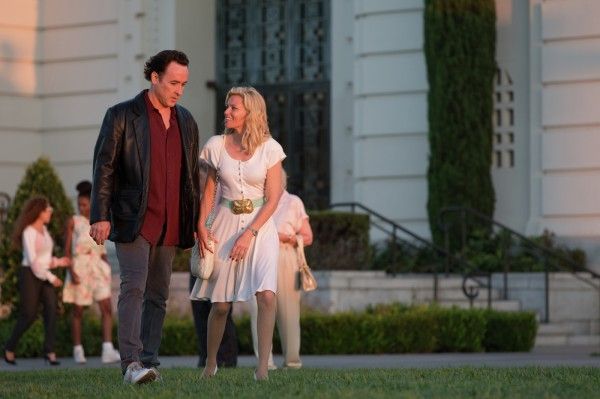The Beach Boys are one of my favorite bands of all time, and their seminal 1966 album Pet Sounds is also one of my favorite albums of all time, so I came into director Bill Pohlad’s Brian Wilson biopic Love & Mercy with high expectations and a significant degree of skepticism. As it turns out, the film is everything one could want out of a Brian Wilson movie and more, transcending the biopic genre to become a portrait of genius, mental illness, and love.
Pohlad takes a non-traditional approach to the biopic formula by splitting the film's story between Wilson in his 20s (Paul Dano) and Wilson in his 40s (John Cusack), focusing on the creation of Pet Sounds and the troubled follow-up album SMiLE in the Dano timeline and Wilson’s reclusive nature, severe mental illness, and abusive relationship with his caretaker in the 1990s-set sequences. Dividing up the life of one character between two actors while still providing audiences with a consistent throughline is no easy task, but Cusack and Dano walk this tightrope perfectly, with Cusack turning in his best performance in years.
It’s no secret that Brian Wilson was the principal creative force behind The Beach Boys, crafting many of the group's unforgettable arrangements that would become classic earworms for decades on. He worked in tandem with his brothers and cousins, of course, but Brian was always much more focused on the music than the touring, videos, and cover shoots. Love & Mercy opens with an excellent montage that chronicles the early success of The Beach Boys, coming to an end just before they embark on their tour in Japan. It was during this tour that Brian opted to stay behind and work on the next record by himself (the future-classic Pet Sounds), and it’s this point in time that the Dano portion of the film covers.
But the film chronicles two different sides of Wilson's persona, and its other half finds a middle-aged Brian in the early 1990s lonely, afraid, and under the strict, controlling care of controversial psychologist Dr. Eugene Landy (Paul Giamatti). When we first meet Cusack's Wilson, he is perusing a Cadillac dealership where he comes across Melinda (Elizabeth Banks), a Cadillac saleswoman who takes a liking to Brian before she learns of his fame. But something is clearly wrong, as Brian acts a bit aloof, leap-frogging from one seemingly random thought to another while he sits in a car on the showroom floor with Melinda. We then see Dr. Landy enter the dealership and quickly whisk Brian away, handing Melinda an envelope and telling her to take care of the details of the car that Brian wants to buy. Despite Landy's efforts to cut off any relationship before it begins, Brian and Melinda subsequently strike up a friendship that turns romantic, but always under the watchful eye of Landy, with whom Melinda begins to take issue.
While the recording of Pet Sounds was a creatively prosperous period for Brian, it also marked the beginning of his battle with mental illness; he started hearing voices. But the creation of this masterpiece with a group of the most talented session musicians around was an intensely happy time in Brian’s life, and it’s portrayed as such in the film. Instead of taking the traditional music biopic route and skipping straight from song inspiration ("Man, wouldn't that be nice. Hey, that's a song!") to smashing success on the charts, Pohlad relishes in capturing the artistry that went into creating this album, lovingly chronicling the writing and recording of the music, which utilized groundbreaking techniques at the time. Wilson was spurred by The Beatles’ latest creative spurt to make something wholly different from what The Beach Boys had done before, and as he toiled away with wild idea after wild idea, he slowly began piecing together the opus that is Pet Sounds.
But once the rest of the band returns from tour and Brian starts playing for them what was essentially the complete album (it only lacked vocals), further issues begin to arise. Brian and his cousin Mike Love (Jake Abel) disagree about some of the more offbeat musical flourishes, and Brian's under pressure to please his father/ex-manager Murry Wilson (Bill Camp), who was prone to beating the boys when they were young and craves every opportunity to put Brian down. In fact, when Brian plays an early version of “God Only Knows” for his father at a piano, his father says the song is garbage, describing it as “a suicide note.”
Dano does a wonderful job of capturing Wilson at his creative peak, and on the cusp of his larger issues taking hold, but Cusack is undoubtedly the highlight of the film; it’s a performance that reminds us of the actor's immense talent (and how it's been wasted in recent years). This is no affected, twitchy take on mental illness—he cuts at something deeper within Brian Wilson, bringing to mind something akin to a wounded dog who’s not quite sure if he’s in the company of someone friendly or harmful. Granted, Cusack takes no effort to make himself look like Brian Wilson (he just looks like John Cusack throughout the film), but it's a great performance regardless. Elizabeth Banks is integral to the film’s success as well, and she shines as the gentle, kind-hearted, and strong Melinda, who acts as an excellent foil to Giamatti's controlling and anger-prone Dr. Landy.
But the two halves of the film work hand-in-hand. The 1990s scenes are made all the more impactful by Paul Dano’s stellar, foundational work in the 1960s-set scenes, as Brian struggles to overcome rejection from just about every person in his life, all the while trying to decide whether the voices in his head are real or just some paranoid delusion.
The film also marks a strong second effort from director Bill Pohlad, who is a producer by trade and has credits on films like 12 Years a Slave, The Tree of Life, and Into the Wild. With Love & Mercy, he proves he has some serious chops behind the camera. Pohlad shoots much of the in-studio scenes in a documentary-like style, almost as if we’re watching archived footage. He also reenacts some famous videos of the Beach Boys themselves in uncanny fashion, especially when it comes to the black-and-white “Sloop John B” interlude. Conversely, the 1990s-set scenes have a specific, subtle aesthetic tone to them as well, and the way in which Pohlad visually conveys Wilson’s mental issues is deeply unsettling. While the film is a tad on the long side and it feels like it has one too many endings, I imagine even those who aren’t familiar with Wilson and/or the history of the Beach Boys will find this story compelling from start to finish.
Pohlad is aided in his effort by a wonderfully trippy, haunting score by Atticus Ross. There’s also an excellent sound mix that distorts some of the classic Beach Boys songs, adding an uneasy layer to the soundscape. And speaking of songs, Dano’s singing voice as the young Brian Wilson is surprisingly solid. It’s not a mimic of Wilson exactly, but it maintains the spirit of his wistful tone.
The life of Brian Wilson is both inspiring and tremendously sad. He seemed to be searching for some kind of freedom, be it physical or abstract, and he rarely found it outside of the autonomy and creativity of the studio. In Love & Mercy, it’s upsetting to see a guy so talented treated so poorly, especially when his mental state renders him childlike at times. But his life is also well worth celebrating, and Paul Dano and John Cusack bring this tortured genius to the screen with sensitivity, nuance, and sincerity, which are fitting for a soul as cherished and fragile as Brian Wilson’s.
Rating: B+
Click here for all of our TIFF 2014 coverage. Click on the links below for our other TIFF 2014 reviews:
- Backcountry
- Cub
- The Drop
- Electric Boogaloo
- Face of an Angel
- Force Majeure
- Foxcatcher
- Haemoo
- The Humbling
- The Imitation Game
- It Follows
- The Look of Silence
- Manglehorn
- Men, Women & Children
- Mr. Turner
- Nightcrawler
- Pawn Sacrifice
- The Reach
- The Riot Club
- Rosewater
- The Tale of Princess Kaguya
- This Is Where I Leave You
- The Wanted 18
- Top Five
- Welcome to Me
- What We Do in the Shadows
- While We’re Young
- Whiplash
- Wild



